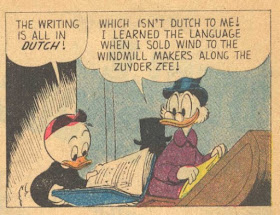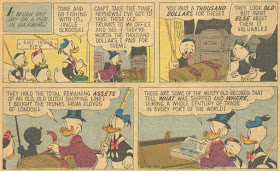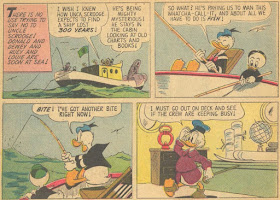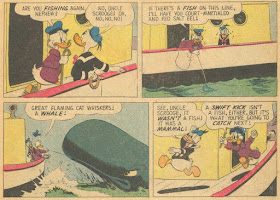A TERRIFYING HALLOWEEN TO ALL AND SUNDRY! I was going to leave it at "The
Flying Scot," but I just couldn't resist covering this other
"Flying" story--it is an interesting
coincidence that they were released so near to one another, even if
there was no influence of the one on the other. Also, with "The
Flying Horse" and "The
Flying Farm Hand," I've now written about FOUR stories
that start with "The Flying." In the future, I shall
diligently endeavor to expand this list.
So...Barks! "The Flying
Dutchman!" This, of course, is one of the surprisingly few
"Scrooge's treasure hunt" stories that he wrote, and thus
it had outsized influence on Rosa's work.
Just look at that art! Barks was the
only Western artist who could compete for quality with the best of
the Italians, and man, when he was on, he was just...on. I know I
praised a few similar Scarpa drawings last time, but let's face it:
compared to The Master, they pale pretty significantly. That is just
plain cool-ass.
Did Rosa include this little "fact"
in the L&T. Probably. I don't exactly remember. Note, however,
that Barks' willingness to include a bit of nonsense like this
demonstrates that he was in a looser, flakier mode when writing this
story. Comparable to Scarpa's more-or-less constant flaky mode?
Well...not really. I suppose you could pounce all over me for being
willing to indulge such things from Barks more than his supposed
Italian counterpart, but you have to admit, there's a pretty darned
big difference between them. And I don't think Scarpa gets the
better end of it.
Do note, however, that he still brings a certain amount of verisimilitude to the table. Flakinesswise, this can't begin to compete with "Interplanetary Postman" or "Queen of the Wild Dog Pack."
More ship! Ya gotta
show a ship with blood-red sails for a Halloween entry! Otherwise,
you should probably reevaluate your life. The writing is simple, but
effective. Even when (as we'll see) Barks was more or less phoning
it in, you still get effective little bits like that. Anyway, it's
off to find the Flying Dutchman! Join us, won't you?
So as noted, the thing about this story
is, I have to admit that it's pretty darned thin.
Before I reread it for this entry, I didn't remember it very well,
and coming back to it, I was actually kinda shocked by how little
there there is. I think it's pretty apparent what
happened: Barks came up with the initial hook for a Flying Dutchman
story, but it must've quickly become apparent that with no other
embellishment, this wasn't really going to be enough to fill out an
adventure-length story. So he just kinda punted and filled the story
out with gags--most of them involving Donald's obsession with
fishing. Barks is Barks, of course, and his native talent meant that
he was able to come a lot closer to getting away with this than
anyone else would've been. But...I can't in good conscience assert
that he ultimately does, quite. It really is
striking how aimless the story feels. Some of the
gags are okay, but there's no sense of urgency or of anything really
being at stake, and so it goes on until it just kinda ends. Don't
get me wrong; it's not unpleasant to read, and I'll take it over "The
Flying Scot" any day, even if the latter does
have more of a semblance of a plot, but it's certainly not Barks
firing on all cylinders.
The story's first fishing gag, and
surely its most bizarre. Donald was using a crude line drawing of
Scrooge as a fish-dartboard? Whaa? Also, pretty darned inhumane to
the fish, I must say!
You could defend this bit on the basis
that, hey, at least the fishing impacts an unrelated plot point!
And...yes, it does. But the only thing it really leads to is this
little detour to South Africa which really contributes nothing to the
story and could easily have been excised. Go figure!
Well, Donald does
have a point here. Whales are not fish! This is a good lesson for
kids to have hammered into their heads from a young age, so I'm glad
it's here. There's a lot of bits here of Scrooge chasing/yelling at
Donald. This is the sort of thing that heavily influenced Rosa,
but--this is the key thing!--Barks is never sadistic about it. It
never feels like a real sort of violence.
Even if, as I've said, nothing ever
goes much of anywhere, this whole build-up to the storm is well-done,
with some good atmosphere. It's not a patch on the Horseradish
story, but it's still quality stuff.
...and this, of course, is just the
fucking best. Hurrah! Happy Halloween!
'Course, that leads to this
jarringly out-of-character Scrooge moment. Home? Whatever happened
to "I just haven't the strength to give up?"
I can't deny it: Unca Carl botched this one pretty badly.
But it's not all bad! That
Donald/Scrooge interaction genuinely makes me ell oh ell, for one,
even if I can't say I find Donald's monomaniacal fishing obsession to
be the all-time greatest characterization either.
Yay again! Sort of.
By which I mean, I suppose one probably
didn't really expect a supernatural explanation,
but the one we get is pretty darned uninteresting (and also far-fetched, though nothing compared to Scarpa's "the boat somehow turned into a glider!" business). Big ol'
anticlimax.
Note also that even though this is
technically a treasure hunt, that really feels like an afterthought.
We just get this one abrupt look at the gold bars,
seemingly out of nowhere, and that's that. Compared with "The
Mines of King Solomon," in which we're given the chance to share in
the excitement of the discovery, this comes across as perfunctory
indeed.
And so, it ends! With another fishing
gag! Even though the action's clearly over, this really doesn't feel
like an ending; the story just seems to abruptly stop, like Barks was
thinking, gotta fill the page count gotta fill it gotta fill it
gotta--BAM. DONE. MISSION ACCOMPLISHED.
















No, Don Rosa did not referend the wind-selling part in 'L&T'. Maybe we're supposed to assume this all happened at some point after 1947. Do note, also, that this sort of nonsensical comment by Scrooge to explain how he knows foreign tongue X is sort of a running gag in late 50's Barks. It also pops up in the 'Golden City' story, where he apparently learned old Siamese when "selling maps to Marco Polo". When I was younger, it got me dreaming about a "Life and Times" episode where Scrooge travels back in time on business, an awesome story that we of course never got. Even today I'm not sure exactly what Barks meant with these comments.
ReplyDeleteAnyway, I too was disappointed with the "scientific" explanation, especially seeing how it's just about as crazy on its own as it gets. If it could really work that way, we'd be seeing projections of polar bears and penguins on every storm cloud. Even if it does not make much more sense, Scarpa's explanation with a boat turning into a glider was way more satisfying, because magic or no magic, that means you've actually got a goddamn flying ship, and that is awesome in itself regardless of its spookiness.
Also, "one probably didn't really expect a supernatural explanation"? I certainly did. Having read The Flying Scot and also a 70's Cavazzano story about the Dutchman before this story probably had something to do with it, but the fact is there: at first I really thought it was a ghost ship, adding to by disappointment.
Rosa DID reference the wind-selling thing. It's in a single panel of "The Empire Builder from Calisota", right before the North Pole Peary sequence.
ReplyDeleteIs it now?… Well, I'll be doggone: you're right! But our French translation had made it unrecognizable (in our version, he's merely selling the windmills themselves).
ReplyDelete" but there's no sense of urgency or of anything really being at stake, and so it goes on until it just kinda ends"
ReplyDeleteThey are lost in the sea, in a storm, without any way of directing the boat, almost without food, without a compass (and the storm makes, until the last panels, impossible to use any kind of navigation by sun or stars) - seems very dramatic.
"But the only thing it really leads to is this little detour to South Africa which really contributes nothing to the story and could easily have been excised. "
I think this point is central to the story - the whole ambience of despair (including the apparently strange attitude of Uncle Scrooge not wanting to continue to search for the treasure) is the result of they being, initially, wrong about the location of the ship, and, after that (the episode in south Africa), being in mode of not knowing what to do.
Note - I read this story for the first time with 6 years old; I admit that my opinion could be different if my first contact with the "The Flying Dutchman" had been at a later age (perhaps 6 y.o. kids are easily fascinated?).
You know? I'm pretty sure if Mark Twain was still alive today and instead of writing books he was writing Disney comics reviews and he would see this post, he would be so full of envy and jealousy it would drive him into deeps of insanity, he would kidnap Geox, drag him to his spooky castle in the forbidden forest, he would locked poor Geox in a cage like a wild animal and at the pick of darkness consuming his soul, he force him to write THE ULTIMATE REVIEW so he can publish it under his name, all while, as part of his new narcissistic ego he would send creepy riddles to the police to see if they can figure out where he is hiding before it’s too late (ala The Zodiac Killer) and all that would climax in a dramatic fight in burning windmill, with Twain falling to his doom and some enigmatic gypsy woman would appear in the mist and tell people to ask themselves “who was the real monster here?”
ReplyDeleteWELL, so much for my Halloween post! HAPPY HALLOWEN/ALL SOULS DAY/BUENOS DIA DE MURETOS
I agree with Miguel Madeira that there's plenty at stake here. The Ducks are in pretty dire circumstances.
ReplyDeleteTrue, there's not enough plot here. And true, the "scientific" explanation is a let-down. In terms of spookiness quotient, though, I do like the fact that the captain's log gives historical weight to the idea of the cursed vessel, with its reference to plague and desertion. It is of course typical of Barks to provide natural explanations for apparently supernatural phenomena such as ghosts. It's probably more of a let-down in this instance because the ghost ship is just so awesome.
In defense of the bogus explanation, Achille, I would note that both the aurora and the unusually high phosphorus content of the iceberg are deemed crucial to the production of the remote mirage, perhaps explaining why we're not constantly seeing projected penguins.
My biggest problem with the "science" is how the iceberg's swinging into the wind can explain why the ship's image *repeatedly bounced and projected hundreds of miles away* is also seen as sailing into the wind!
I have read, and very much like, the Martina/Cavazzano "vascello fantasma" story. In some ways, I like it better than Barks' "Flying Dutchman." Nothing compares visually to Barks' splash panel of the first sighting of the ship. But the Flying Dutchman is a real ghost ship, with a lovely spooky story where the captain played dice with the devil for his soul through a century of storms. There's a more substantial plot, and HDL get to save the day in more than one way at the end. In any case, it's the only story by Martina that I have saved to re-read.
Hey, I was probably sixish when I first read this story, too! Fair's fair!
ReplyDeleteI'll concede that I'm probably underrating the storm section at least a bit, but I maintain that it suffers from not really being part of a better-developed narrative.
Pan Miluś, that's the best compliment (?) I've ever gotten. Or maybe just the most alarming. Anyway, cheers!
Speaking of Barks's habit to produce natural expalanations to all his supernatural spookinesses… this, by the way, makes me wonder why Don Rosa decided to introduce the McDuck ghosts and then the freakin' Afterlife (in "Quest for Kalevala"), when no signs whatsoever of either existed in the Barks corpus.
ReplyDelete@Achille: Because Rosa also enjoys movies and literature featuring real ghosts? Just as the Black Knight was inspired in part by sources in other genres. You will note, though, that in "The New Laird" it is left so that Scrooge and his family are unaware of the existence of the McDuck ghosts (since Scrooge doesn't consciously remember his preview of heaven or, presumably, Sir Quackly's handing him his sword). Thus continuity with the Barksian world of "The Old Castle's Secret" is maintained. One could even argue that "The New Laird" provides an explanation for why the real Sir Quackly ghost didn't scare away the fake one: he had learned his lesson about interfering in events in the land of the living. (The group-scare of the Whiskervilles at the end of "The New Laird" doesn't change the course of events.) "Quest for Kalevala" was a thank-you gift to Rosa's Finnish fans, and its content reflects the Kalevala itself. Whatever others think about it, the Finns LOVED it.
ReplyDeleteOn Barks' attitude towards the supernatural: following Barks, Rosa has strongly argued for Magica's status as a mortal sorceress, not a witch with inherent magical powers. There's still a supernatural element in the spells and magical artifacts, but Magica herself is a (duck-shaped) human.
I'm not saying I dislike the ghosts themselves, or "Kalevala"; I actually love both. I just find that they are quite an odd addition to make to the mythos from someone who claims to follow Barks's footsteps. I don't think you can compare it with the Black Knight; the idea was inspired by other sources, sure, but his existence doesn't change the nature of the universe. Meanwhile, in Barks, we have no evidence whatsoever that there is an Afterlife at all. Characters like the resurrected Persians of "Ancient Persia" even seem to be weak evidence against it.
ReplyDeleteI believe Barks shied away from including ghosts or other "real" supernatural elements in his stories because it was his impression that Disney (or Western) wouldn't allow it. (Unfortunately I can't remember where I read this.) Decades later and working under very different management, Rosa was subject to no such prohibition.
ReplyDeleteThis comment has been removed by the author.
ReplyDeleteHey! Don Rosa discussion! ... that I can't quite contribute to because I'd have to read and type a lot more, and like I said in my last comment I'm still recovering from the surgery and will turn off my computer for the rest of the day after reading this comment!
ReplyDeleteI will say that I maintain, generally speaking, that Rosa's work is best viewed as an integrated part of Barks' work, rather than a separate entity unto itself. Sort of like the difference between New Vegas's DLC and Warcraft II's Tides of Darkness. Looked at that way I find that the crazy mishmash of the Peeweegah, the Yeti, unicorns, and things like the ghosts, the Kalevala, and the pre-Inception-by-his-own-admission-accidentally-taken-from-another-movie entering a dream machine seems all to match. Two great tastes that taste great together! It's why I'm so glad I discovered them both at the same time. I might not appreciate Barks as much, or Rosa, if I'd discovered them independently.
I will admit that this story seems weak (and hoo boy does the coloring not do anything justice!) from a plot perspective, but I am also with you on the visuals. Barks never seemed happier in his art than when he got to draw anything related to the sea, and I love it. I get the feeling that a little sprucing could have made this a more unified tale, considering how much we've seen of his cut panels and the like, but you can't pull off your best every time. It's just stunning, in a very good way, that his 'decent' is so long-lasting for many. Even if it's just a silly joke about swordfish (a gag actually used in his "A Descent Interval" in a slightly modified form) or the striking image of red sails on a ship, he knew how to hit a bullseye somewhere in the story, even if he was just throwing darts en masse like swordfish.
I got kind of gushy there, I'm sorry, I'm just so pleased to be able to read this stuff again. And I really have grown to enjoy Barks even more over time. I'd much rather be gushy than grouchy about this stuff anyway!
And once again, a belated Happy Halloween.
Mysterious XOEG, I have to admit, I'm surprised by something you wrote in the second paragraph. Just sort of tossed off that "This, of course, is one of the surprisingly few "Scrooge's treasure hunt" stories that he wrote." Not having the esoteric knowledge of some of the other learned discoursers, I have to ask, "Is that honest-to-god true?" I'd always thought Barks wrote nearly all of what he drew...
ReplyDeleteSorry, "wrote" there was just meant as shorthand for "created."
ReplyDeleteIn a personally amusing coincidence, as part of Inktober, I had planned to draw the oil painting Barks did for this story as one of the final drawings in the month. Time constraints prevented me from doing so, but imagine my surprise when you update the blog with this exact entry...
ReplyDelete...Which, I'll confess with no little shame, it's one of the Barks tales I actually hadn't read beforehand. That it's apparently one of Barks' less tightly-structured adventures should set my expectations accordingly; I don't doubt I'll be charmed regardless, though. The art is amazing all the way through, and the Scrooge/Donald interaction seems like Rosa's done right.
(Not that Don couldn't deliver great Scrooge/Donald interactions! But this talk of the Kalevala tale, which starts with a helpless Donald complaining about Scrooge whacking him endlessly with his canes, reminds me of just how alien the relationship between the two could get)
And speaking of the Kalevala business, more specifically Achilles Talon's comments on such stuff not quite gelling with Barks' mythos...Don't forget Rosa introduced Panchito Pistolas and José Carioca to the Barksverse, explicitly referencing the Three Caballeros while doing so. Which, one simply can't reconcile the surreal madness of that movie with Rosa's much more grounded verse! But it's one of those detours from the norm that make for delightful stories anyway, so no complaints.
Hey, waaaaaaiiiiiit a minute...since when Italians are not Western people????!!!!!
ReplyDeleteSpeaking seriously, I agree on most of what GeoX said in his reviews. Though my "emotional" reaction is a bit different. The plot going aimless (like lost in in the see?), the non-treasure hunt and the reiteration of Donald's obsession for fishing (supported by excellent gags) are the reasons why I found so fascinating this story! (I can't wait to re-read it in English...come on Fantagraphics! Even if I would like to see some volumes from the damn 40's in the forthcoming issues...).
ReplyDeleteIf it can help: I first read this story at the age of 26 I guess, not 6 :)
Funny fact corner: a BIG COVER SPOILER in the latest Italian reprint of the story (2015):
https://coa.inducks.org/issue.php?c=it/UACK+10#hc
"Western" on this blog is almost always referring to Western Publishing--Dell, Gold Key, Whitman :)
ReplyDeleteahahaahahahahahahahah sorry, my bad XD
ReplyDeletePerhaps a thing that can make the story seems to have a weak plot is that, during a big part of the story, the ducks did not really do anything? From the moment when they understand that "Die Fliegende Hollander" is "The Flying Dutchman" (and Scrooge decides to end the treasure hunt) to the moment when they find the boat, they are simply in the hands of outside forces (the storm, the winds, etc.) - even the discovery is because the wind (or the streams?) takes them to the ship, not because they are actively searching it (much the opposite - they seem to be with some fear of arrive to the "point").
ReplyDelete"This, of course, is one of the surprisingly few "Scrooge's treasure hunt" stories that he wrote"
ReplyDeleteThis is an interesting point. As you remarked in your review of "The Mines of King Solomon" back in 2010, we usually tend to think of Barks having done many treasure hunt stories, but there are actually few of them. Though, of course, it depends on how we define a treasure hunt story, since the definition may vary from one reader to another.
@Achille
You are wondering why Rosa decided to use the McDuck ghosts and the Kalevala's Afterlife in his stories. I think thes two links answer it:
https://lists.nafsk.se/pipermail/dcml/2003-August/018887.html
https://lists.nafsk.se/pipermail/dcml/2003-August/018902.html
@Richie
In 2009, Don Rosa was asked (on the Papersera Forum) if he viewed "The Three Caballeros" as part of his canon, and this was his answer:
"obviously the "Three Caballeros" can't be something that "really happened" -- as much as I *love* that film (for me, the only good use Disney ever made of Donald Duck), the characters were "actors" appearing in a fantasy travelogue. There was no reality to it -- it was song and dance."
Much, much later....
ReplyDeleteI first read this story at the tender age of 69, which was just last week! - in the new Fantagraphics volume 22. Though I had long known of it by reputation - via the red ship image, I was very disappointed in the story itself.
So, I have come to GEOX for a 2nd opinion - hoping maybe to find I'd overlooked some hidden bit of Barks genius. But no, GEOX agrees: "it's pretty darned thin".
That was my impression too - and I found Donald's many fishing gags either tedious filler, or plain implausible [eg when he inadvertently flips the map over - a major plot devpt point, but a very weak one.]
I cant say my poor opinion of this story is simply due to my great age, or an increasingly curmudgeonly character! Overall, I think Fanta's vol.22 is wonderful -one of the very best in the series to date. And at least half the other stories in there were also new to me.
Keep up the good work.
yours,